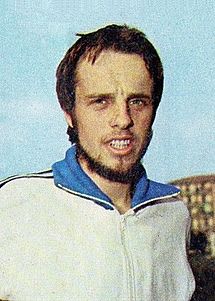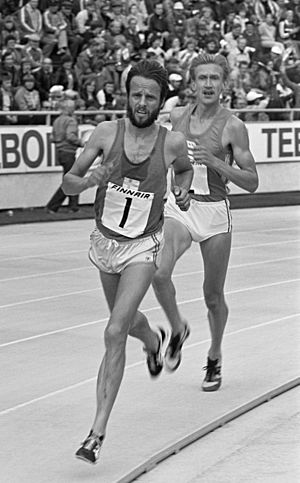Lasse Virén facts for kids

Lasse Virén c. 1974
|
|||||||||||||||||||||||
| Personal information | |||||||||||||||||||||||
|---|---|---|---|---|---|---|---|---|---|---|---|---|---|---|---|---|---|---|---|---|---|---|---|
| Full name | Lasse Artturi Virén | ||||||||||||||||||||||
| Nationality | Finnish | ||||||||||||||||||||||
| Born | 22 July 1949 Myrskylä, Finland |
||||||||||||||||||||||
| Height | 180 cm | ||||||||||||||||||||||
| Weight | 60 kg | ||||||||||||||||||||||
| Sport | |||||||||||||||||||||||
| Country | |||||||||||||||||||||||
| Sport | Athletics/Track, Long-distance running | ||||||||||||||||||||||
| Event(s) | 5000 metres, 10,000 metres, Marathon | ||||||||||||||||||||||
| Club | Myrskylän Myrsky | ||||||||||||||||||||||
| Achievements and titles | |||||||||||||||||||||||
| Olympic finals | 1972 Munich 10,000 m,
Marathon, 5th 1980 Moscow 10,000 m, 5th |
||||||||||||||||||||||
| Personal best(s) | |||||||||||||||||||||||
|
Medal record
|
|||||||||||||||||||||||
Lasse Artturi Virén (born 22 July 1949) is a famous Finnish former long-distance runner. He won four gold medals at the Olympic Games in 1972 and 1976. Virén was known as a "Flying Finn", a nickname for great Finnish runners like Paavo Nurmi. He was named Finnish Sportsman of the Year in 1972 and 1976. Later, he became a politician and served in Finland's parliament.
Contents
Lasse Virén's Early Running Career
Virén started his running journey in the United States. He ran for Brigham Young University for one season. After that, he returned home to Finland.
He was a police officer from Myrskylä. Virén first competed internationally in 1971. At the 1971 European Championships, he finished seventh in the 5000 metres and 17th in the 10,000 metres. His coach believed he could have done better. Shortly after these championships, he broke the Finnish record for the 5000 metres.
Virén trained very hard in Thomson's Falls, Kenya. He achieved impressive results before the 1972 Olympics. He even broke the world record for the 2-mile race. These successes made him a strong, but unexpected, competitor for the Munich Games.
Olympic Gold Medals in 1972
At the 1972 Summer Olympics in Munich, Virén won both the 5000 and 10,000 metres races.
Breaking Records in the 10,000m Race
In the 10,000 metres final on September 3, Virén broke a seven-year-old world record. He even fell during the race in the twelfth lap. Another runner, Mohamed Gammoudi, also fell. Virén quickly got back up and caught the leading runners. With 600 metres left, he started a powerful sprint. He won the race in 27 minutes and 38.35 seconds.
Virén was the fourth athlete to win both the 5000m and 10,000m at the same Olympics. Other famous runners who achieved this "double" include Hannes Kolehmainen and Emil Zátopek.
Winning the 5000m Race
One week later, in the 5000 metres final, Virén kept up with top runners like Steve Prefontaine. He sprinted past Gammoudi near the end. Virén won in 13 minutes and 26.4 seconds.
Four days later, in Helsinki, he set a new world record for the 5000 metres. He ran it in 13 minutes and 16.4 seconds.
Virén's success in 1972 was partly due to his smart running. He ran very close to the inside edge of the track. This saved him many metres compared to his rivals. This technique is sometimes called "bend mathematics."
The "Double Double" at the 1976 Olympics
Virén continued to run well between the Olympics. At the 1976 Summer Olympics in Montreal, he won both the 5000 and 10,000 metres again. This amazing achievement was called the "double double." He was the first runner to win the 5000 metres twice in Olympic history.
The 10,000m Victory in Montreal
He won the 10,000 metres final quite easily. He passed Portugal's Carlos Lopes near the end of the race. Virén finished almost five seconds ahead of Lopes.
After winning the 10,000 metres, Virén took off his running shoes. He waved them to the crowd during his victory lap. The International Olympic Committee (IOC) thought he was trying to show off his shoe brand. But Virén said he had a blister. The IOC first suspended him from the 5000 metres final. However, after an appeal, he was allowed to race just two hours before it started.
The Challenging 5000m Race
In the 5000 metres final, Virén showed incredible strength. He led the race for the last few laps. He held off other great runners like Dick Quax and Brendan Foster. His last 1500 metres in that race were so fast, they would have placed him high in the 1500 metres final itself. The top four runners finished very close together.
After these two gold medals, he also competed in the men's marathon. This was his first marathon race. He finished in fifth place.
Lasse Virén's Final Olympics
Virén finished his running career after the 1980 Summer Olympics in Moscow. He placed fifth in the 10,000 metres. He had some challenges leading up to these Games. Some people thought his training for the marathon might have affected his speed. Virén himself believed an injury before the Olympics hurt his performance.
He decided not to run the 5000 metres race. Instead, he chose to compete in the Olympic marathon. He started well, leading the race for over 20 kilometres. But stomach problems forced him to stop before 30 kilometres. In the autumn of 1980, he announced he was retiring from competitive running.
Achievements Outside the Olympics
After a leg surgery in 1974, Virén still achieved success. He won a bronze medal in the 5000 metres at the European Championships. He also broke world records for both the 2-mile and 5000 metres races outside the Olympics. These records were set close to the 1972 Olympics. His 2-mile record was 8 minutes and 14.0 seconds. His 5000 metres record was 13 minutes and 16.4 seconds.
Virén's success in 5000m races outside Olympic years was very consistent. He often ran under 13 minutes and 36 seconds. For the 10,000m, he only ran under 28 minutes in Olympic years.
In 1979, Virén competed in New Zealand. This was part of his training for the 1980 Moscow Olympics.
Life After Running
After his running career, Lasse Virén became a well-known person in Finland. He served as a member of the Finnish Parliament. He was a part of the National Coalition Party. He served from 1999 to 2007 and again from 2010 to 2011. He did not seek re-election in 2011.
In 2014, Virén was honored by being added to the International Association of Athletics Federations' Hall of Fame.
See also
 In Spanish: Lasse Virén para niños
In Spanish: Lasse Virén para niños
 | Audre Lorde |
 | John Berry Meachum |
 | Ferdinand Lee Barnett |


